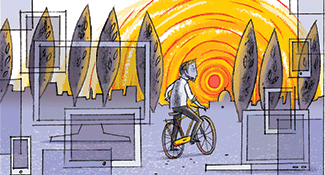My new column (with some inspiration from Marx and Levinas) is up at Hadassah Magazine:
I was not just stir-crazy but screen-crazy. I was working on two computer screens—my laptop’s and the big one on my desk—and had my Kindle on my left and a document open on my tablet on my right, which made four screens, except when one of my kids texted me, when the phone made five.

- Illustration by Christiane Grauert.
I got on my bike. It was late afternoon, with a light Jerusalem breeze blowing. I rode along the promenade that overlooks the Old City, up to where it narrows into a path between tall evergreens, and found a stone bench where I could see the golden Dome of the Rock between the branches. I often come to the same spot on Shabbat, on walks with my wife.
Relief. I inhaled the scent of the woods and thanked God for green.
Then I pulled my phone off my belt. The motion felt like an involuntary twitch of my hand. Anyone watching might have thought that I was checking a news site, but I knew that the screen came first; the choice of what to tap came after. I realized what I had done, looked at the rectangle of glass and plastic and stuck it back on the belt clip.
I thought, “This does not happen to me when I come here on Shabbat.”
I don’t use screens on Shabbat.
It has been such a short time since screens were bulky boxes that we only used at our desks. Then they got smaller and lighter. It is so convenient to be able to take a laptop anywhere—look at me! I can answer my boss while sitting on the porch—especially when the laptop shrank into a tablet and a phone.
Today, the biggest hazard in biking in Jerusalem is no longer the drivers but people texting while walking who do not see me. Nor do they see flowerboxes on housing projects or beggars on downtown sidewalks.
I take the bus from South Jerusalem to Mount Scopus in the north. Even the tourists do not look up from their phones to notice the Old City walls passing by. They could be on a bus in Topeka. I go into a café. A young woman who is clearly considering what to wear tonight sits across from a guy and both tap their phones. As I write this, my hand twitches toward my pocket. Are there new messages? News alerts? Tweets?
But on Shabbat my screens go dark. The custom in Jerusalem is to start Shabbat 20 minutes earlier than elsewhere, which means that there are a full 25 hours from candlelighting to havdala—hours in which, by choice, I am left without my own devices.
I personally know people who wonder how an educated and skeptical person like me could not only feel bound to a bunch of laws derived from an ancient text—but could even think that those laws apply to devices that hit the market this year.
Let them wonder. For 25 hours each week, everything I see is real, not pixels, and I live in a world of things that can be touched as well as seen and heard. I see the trees on the promenade rather than on my screensaver. Songs are something people sing, not YouTube clips.
For six days, I am a compulsive screentapper. On the seventh I belong to Screentappers Anonymous. “Hello. My name is Gershom, and I have been offline for three hours and 12 minutes.”
I did not fully think about my technology habits until I spent a semester in New York as a visiting professor. It was the first time I had lived in America in over 30 years. In Israel, people sometimes immediately and mistakenly think they know everything about me when I tell them not to phone me on Shabbat, but the concept is not new to them.
At Columbia University, I explained to grad students of five religions and multiple nationalities that between sunset Friday and nightfall Saturday I did not answer texts, calls or anything else electronic. Hoping to provide a spark of recognition, I referred in my syllabus to the film The Big Lebowski, where Walter, the big bowler who declares his loyalty to “3,000 years of beautiful tradition, from Moses to Sandy Koufax,” defiantly insists, “I don’t roll on Shabbos.”
Some of my students had never met an observant Jew. If they had seen Lebowski, that line passed them by. They responded to my announcement with wonder and curiosity. What if your phone beeps? (It’s off, I said.) What if your Significant Other texts you? (She doesn’t.) How is it possible to be unavailable all that time, to not communicate?…
Read the rest here.





